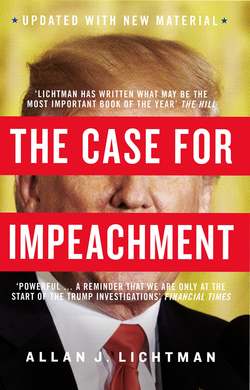Читать книгу The Case for Impeachment - - Страница 20
IMPEACHMENT’S BIG ISSUES
ОглавлениеAmerica’s founders, insisted the prosecutors, placed no restrictions on what qualifies as an impeachable offense. Impeachment is not meant solely “for the punishment of crime,” argued the chief prosecutor, Benjamin F. Butler of Massachusetts. A president should be impeached and convicted if he “imperils the public safety” and shows himself “unfit to occupy official position.” Wrong, said Johnson’s defense attorney Benjamin Curtis. Impeachment, he argued, requires a violation of law and not just of any law, but of “only high criminal offenses against the United States.” The Senate cannot sit “as some nameless tribunal with unbounded and illimitable jurisdiction.”21
Prosecutors claimed that Johnson had no absolute authority to disobey the law, and that his discretion begins and ends with his veto power. The right “to judge upon any supposed conflict of an act of Congress with the Constitution is exhausted when he has examined a bill sent to him and returned it with his objections,” Butler said. After that, he “must execute the law, whether in fact constitutional or not.” Otherwise, “the government is the government of one man.”22
The House’s constriction of presidential power “does offend every principle of justice,” responded another presidential lawyer, William Evarts. “If an act be unconstitutional [the president] had a right to obey the Constitution,” and “to raise a question between the Constitution and the law.” The prosecutors, he warned, had proposed a subversive doctrine that “constitutional laws and unconstitutional laws are all alike in this country,” and the president must obey both equally.23
In their final bold argument against excessive presidential authority, prosecutors said that the laws of Congress restricted the president’s powers to remove federal officials. “If we concede such royal power to a president,” said Representative John A. Logan of Illinois, “he is henceforth the government.” Americans must ask, “Will you have Andrew Johnson as President or King?” Johnson’s attorney general, Henry Stanbery, who rose from a sickbed to defend his president, argued that the Constitution granted the president absolute authority over removing administration officials. He fired Stanton “in the exercise of an undoubted power vested in him by the Constitution,” performing “a strictly executive duty.”24
Eventually, the Senate voted on three of the House’s charges, only to fall one vote short of the two-thirds needed for conviction in each case. Seven Republicans joined all the minority Democrats in voting for Johnson’s acquittal. “I knew he’d be acquitted; I knew it,” declared Johnson’s wife, Eliza, unsurprisingly his staunchest supporter.25
Yet defecting Republicans who saved Johnson’s presidency may have been informed less by a quest for justice than by the rules of presidential succession at the time that would have elevated the controversial President Pro-Tem of the Senate, Benjamin Wade of Ohio, to the presidency. The outspoken Senator had earned the nickname of “Bluff” and alienated many fellow Republicans with his radical views on Reconstruction and his support for paper money and protective tariffs. James Garfield, then a member of Congress, privately wrote that conservative Republicans feared “the Presidency of Ben Wade, a man of violent passions, extreme opinions, and narrow views.”26
